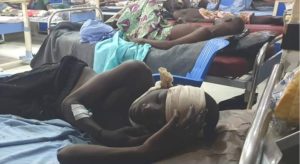
GWOZA, Nigeria – The northeastern Nigerian town of Gwoza was plunged into chaos and grief on Saturday as coordinated suicide bombings carried out by suspected female attackers left at least 18 people dead and 30 injured, including 19 seriously. The horrifying events unfolded over a span of minutes, leaving the community in shock and mourning.
The first explosion shattered the joyous atmosphere of a marriage celebration at approximately 3 p.m., according to Barkindo Saidu, director-general of Borno State Emergency Management Agency. As the bride and groom exchanged vows, a female suicide bomber detonated an explosive device, turning the scene into one of carnage and despair.
“Minutes later, another blast occurred near General Hospital,” Saidu recounted to reporters, describing the horror of the second attack. As emergency responders and bystanders rushed to aid the injured, a third bomb went off at a funeral service. In a chilling act of deception, the female bomber disguised herself as a mourner, infiltrating the grieving crowd before detonating her device. Among the victims were children and pregnant women, amplifying the tragedy.
No group has yet claimed responsibility for the attacks, but Gwoza’s location in Borno State—a region that has been a battleground for the Islamist extremist group Boko Haram since 2009—raises suspicions. The group, known for its brutal tactics and use of female suicide bombers, has terrorized the region for over a decade.
Saidu provided a grim assessment of the injuries, detailing cases of abdominal ruptures, skull fractures, and severe limb injuries. “I am now coordinating for a chopper tonight,” Saidu said, underscoring the urgency of the situation. “I have mobilized emergency drugs to complement the shortage of drugs in Gwoza.”
In the wake of the attacks, authorities imposed a curfew on the city, and the community remains on high alert. Reports of another suspected bomber in the nearby town of Pulka, just over a mile away from Gwoza, have heightened tensions and fear.
Gwoza, situated a few kilometers from Chibok—infamously known for the abduction of 276 schoolgirls in 2014—has endured its share of suffering. Nearly 100 of those abducted girls remain in captivity, a stark reminder of the persistent threat posed by extremist groups in the region. Since the Chibok abduction, at least 1,500 students have been kidnapped across Nigeria, as armed groups increasingly turn to abductions as a lucrative means to fund their activities and exert control over local populations.
The frequency and brutality of these attacks have left communities in a state of perpetual fear. Saturday’s bombings are a tragic testament to the ongoing violence that has plagued northeastern Nigeria. Families are left to mourn their loved ones, while survivors grapple with the physical and emotional scars inflicted by the blasts.
Local authorities and emergency services are working tirelessly to provide aid and support to the affected families. The resilience and solidarity of the community will be crucial in the days to come, as they seek to rebuild and recover from this latest atrocity.



